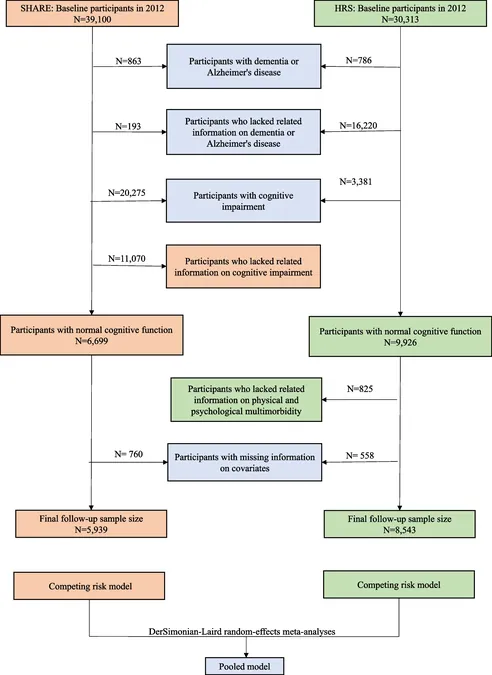
Alarming Link Between Multimorbidity and Dementia Risk: What New Research Reveals!
2024-09-27
Author: Nur
Introduction: Burgeoning Dementia Crisis
Dementia is a pressing public health challenge, particularly as our population ages. Current estimates indicate nearly 50 million people worldwide suffer from this debilitating condition, with 10 million new cases emerging annually, according to the World Health Organization (WHO). Projections suggest that by 2030, the number of individuals living with dementia could soar to 75 million, escalating further to 132 million by 2050. This dire scenario has spurred global efforts to identify risk factors and develop preventive strategies.
The Research: Linking Multimorbidity and Dementia
Recent studies have scrutinized single physical or psychological disorders and their effects on dementia risk. However, a new comprehensive study sheds light on the more complex reality of multimorbidity—where individuals simultaneously suffer from multiple chronic conditions. By analyzing data from two extensive multinational cohorts, the Health and Retirement Study (HRS) in the United States and the Survey of Health, Ageing and Retirement in Europe (SHARE), researchers sought to understand how physical and psychological multimorbidity affects the risk of dementia among older adults.
With data spanning from 2012 to 2018, researchers evaluated thousands of participants to establish a clearer picture of this relationship. They defined physical disorders as including seven physician-diagnosed conditions and assessed psychological well-being through established scales. Dementia diagnosis was determined using a combination of self-reported issues and cognitive evaluations.
Key Findings: A Wake-Up Call
The findings were indeed alarming. The prevalence of physical and psychological multimorbidity stood at about 17.3% in Europe and 15.5% in the U.S. The incidence rates of dementia were higher still, with notable figures of 10.5 and 14.8 cases per 1000 person-years in the respective regions for those with multimorbidity. Crucially, the risk of developing dementia for those suffering from both physical and psychological disorders skyrocketed—by 86% in Europe and a staggering 176% in the U.S.!
Pooling the data from both regions, participants with physical and psychological multimorbidity showcased a 115% heightened risk of dementia. This striking correlation highlights the necessity for healthcare providers to move away from treating ailments in isolation.
Implications for Healthcare: A Call for Integrated Care Solutions
With the statistics now laid bare, it’s clear that physical and psychological health cannot be detached when assessing dementia risks. The study emphasizes the urgent need for integrated care that addresses the co-occurrence of conditions among older adults. Current healthcare models often lack the coordination required to deal with the complexity of multimorbidity, which can lead to inefficient management of both physical and mental health needs.
As the prevalence of multimorbidity continues to rise, healthcare systems across the globe must evolve. This includes implementing multidisciplinary care approaches, such as community teams that merge physical and psychiatric healthcare, potentially mitigating the escalating dementia crisis.
Conclusion: The Path Forward in Dementia Prevention
The research's compelling findings underscore the importance of holistically addressing the physical and psychological health of older adults to forestall dementia. As health professionals confront a rapidly aging population, informed strategies that embrace multiple health dimensions become vital.
While the road ahead may be fraught with challenges, raising awareness and fostering integrated care models represent crucial steps towards altering the trajectory of dementia prevalence. Urgent action is required—not just to alleviate the burden on healthcare systems but to enhance the quality of life for millions.
As new insights emerge regarding the multifaceted relationships between chronic illnesses and cognitive decline, society must collectively push for advancements that empower individuals and healthcare providers alike in the fight against dementia. The stakes have never been higher—let’s not wait until it’s too late!



 Brasil (PT)
Brasil (PT)
 Canada (EN)
Canada (EN)
 Chile (ES)
Chile (ES)
 España (ES)
España (ES)
 France (FR)
France (FR)
 Hong Kong (EN)
Hong Kong (EN)
 Italia (IT)
Italia (IT)
 日本 (JA)
日本 (JA)
 Magyarország (HU)
Magyarország (HU)
 Norge (NO)
Norge (NO)
 Polska (PL)
Polska (PL)
 Schweiz (DE)
Schweiz (DE)
 Singapore (EN)
Singapore (EN)
 Sverige (SV)
Sverige (SV)
 Suomi (FI)
Suomi (FI)
 Türkiye (TR)
Türkiye (TR)